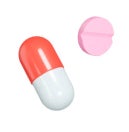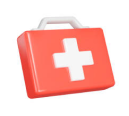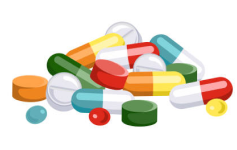Uses
What is Antibiotics for?
Antibiotics are a group of medicines that are used to treat infections caused by bacteria. Sometimes, antibiotics may be prescribed to prevent an infection from developing. This is known as prophylaxis and is especially common before surgery / procedures or in certain medical conditions.
Antibiotics work by killing the bacteria or stopping them from growing and multiplying. Different types of antibiotics are prescribed to treat different kinds of infection (this also depends on the type of bacteria). The duration of therapy is also dependent on the type and severity of the infection.
Antibiotics do not work against infections that are not caused by bacteria such as viral infections (e.g. in common colds or flu) and fungal infections.
Antibiotics may be taken by mouth as liquids, tablets or capsules or by injection. Those who require antibiotics by injection into the blood vein are usually admitted in the hospital because they have a more serious infection. Antibiotics are also available as eye and ear drops or as creams, ointments or lotions for topical application to the skin.
How should I take or use Antibiotics?
It is important to follow the instructions stated on the medicine label for the specific antibiotic that you have been prescribed, to ensure that the antibiotic works properly.
-
Antibiotics are usually taken around the same time every day, where some are to be taken before or after food. In addition, some antibiotics may need to be separated from certain types of food, supplements and other medicines.
-
Antibiotics applied topically to the skin, eye or ears should be applied to the affected area(s) only. It is important to wash your hands before and after application of the medicine.
What should I do if I forget to take or use Antibiotics?
If you miss the dose, take it as soon as you remember. Take the remaining doses for that day at evenly spaced intervals. Do not take double the dose. Make sure that the course of treatment is completed.
Precaution
What precautions should I take when taking or using Antibiotics?
Inform your doctor or pharmacist if you have any drug allergies, glucose-6-phosphate dehydrogenase (G6PD) deficiency, pregnant / breastfeeding or taking any other other medicines or herbal supplements before you start taking antibiotics. Alcohol should be avoided while taking certain antibiotics, such as metronidazole.
Side Effects
What are some common side effects of Antibiotics?
Common side effects include:
- Antibiotics taken by mouth may cause gastrointestinal side effects e.g. abdominal pain, nausea / vomiting and diarrhea. It is usually advisable to take the medication after food if you experience these side effects (unless the medicine label indicates that it must be taken on an empty stomach).
- Antibiotics given by injections may cause local injection site reactions (pain, redness and swelling). These are usually mild and will go away within a few days.
- Antibiotics applied topically to the skin may cause irritation, redness or dryness. When applied to the eyes, it may cause transient blurred vision, temporary stinging/burning/itching/irritation and increased sensitivity to light.
For more information on the side effects caused by specific antibiotics, please consult your doctor or pharmacist.
Antibiotics can sometimes increase the chance of fungal infections in the mouth (oral thrush) or vagina. This is because they kill off the "good" bacteria that help to control the overgrowth of fungi. Hence, the fungi can now grow to a larger number, causing an infection. Consult your doctor or pharmacist if you develop symptoms such as white patches on the tongue or white, curd-like vaginal discharge and itching.
There are some potentially serious, but rare side effects that may be experienced:
- Severe watery and/or bloody diarrhea, fever and painful abdominal cramps. This can occur 1-2 days after you start taking an antibiotic, up to several weeks after you finish taking the antibiotic. This is due to overgrowth of the bacterium in the colon C. difficile.
Stop the medication immediately and seek medical attention if you experience the above or any severe allergic reactions like skin rash (with or without blisters, mouth ulcers, fever and itching), swelling of the eyes and lips or difficulty breathing
Handling
How should I store Antibiotics?
-
Some antibiotics may need to be kept in the fridge whereas others need to be kept at room temperature. Ask your pharmacist about the proper storage conditions of the antibiotic you are taking.
For more information
What else should I know about Antibiotics?
It is important to complete the course of antibiotic treatment as prescribed by the doctor and take the correct dose at the right time. Do not stop taking the antibiotic midway, even if you feel better. This is to prevent antibiotic resistance, which may lead to infections that are harder to treat in the future.
Disclaimers
Please take note that the above is not a complete list of all possible side effects. If you have any concerns about your medication or if you have other side effects that you think are caused by this medication, please consult your doctor or pharmacist.
If you take more than the recommended dose, please seek medical advice immediately. The information provided on this page does not replace information from your healthcare professional. Please consult your healthcare professional for more information.
This article is jointly developed by members of the National Medication Information workgroup. The workgroup consists of cluster partners (National Healthcare Group, National University Health System and SingHealth), community pharmacies (Guardian, Unity and Watsons) and Pharmaceutical Society of Singapore. The content does not reflect drug availability and supply information in pharmacies and healthcare institutions. You are advised to check with the respective institutions for such information.
Contributed by
Last Updated on July 2018

Need More Medicine?
Use Medicine Order Service on HealthBuddy.

Medicines Reminder
Get reminders and chart progress on HealthBuddy.
Related Conditions or Treatments
Related Medicines or Drugs

















